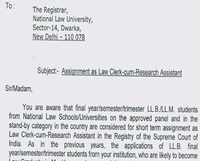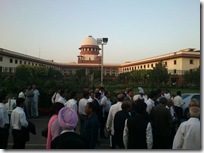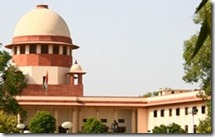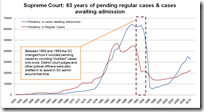Supreme Court
Madhya Pradesh High Court chief justice SA Bobde to be elevated to the Supreme Court. He will become the Chief Justice of India in 2019, after justice Ranjan Gogoi, and will preside for 18 months [Hindu] After the recent decision to elevate Justice AK Sikri, this would take the total bench strength to 30 out of 31 sanctioned places.
Politician LK Advani wants the executive’s say in Supreme Court judges appointment and transfer for “bringing in checks and balances”. He cited a 2008 report of the Law Commission in support [Rediff]
The Supreme Court (SC) collegium has approved the nomination of chief justice (CJ) of Punjab and Haryana High Court (HC) and former Delhi HC judge Arjan Kumar Sikri for elevation to the SC.
Sikri was sworn in as the HC’s 31st CJ on 22 September 2012, after serving as the Delhi HC’s judge for 13 years. He was designated as a senior advocate by the Delhi HC in September 1997.
Sikri graduated from the Campus Law Centre, Delhi University in 1977 and had served as the vice president of the Delhi High Court Bar Association during 1994-1995. [Punjab Newsline]
In February the collegium elevated Andhra Pradesh HC CJ Pinaki Ghose and Himachal Pradesh HC CJ Kurian Joseph, while superseding the nominations of Bombay, Uttarakhand, and Gujarat HC CJs Mohit Shah, Bhaskar Bhattacharya and Barin Ghosh respectively.
Bombay high court (HC) chief justice (CJ) Mohit Shah, Gujarat HC CJ Bhaskar Bhattacharya, and Uttarakhand HC CJ Barin Ghosh will retire without elevation to the Supreme Court (SC) after the SC collegium unanimously rejected their nominations as potentially proving “counter-productive” to the administration of justice.
Titus & Co, which is representing the Republic of Italy and two Italian marines charged before the Supreme Court of India for allegedly shooting two Indian fisherman, said it had not been told of the Italian government’s Monday decision not to comply with its undertaking to return the marines to India to stand trial.
Senior counsel Harish Salve, who was representing Italy and the marines in the matter as to jurisdiction, withdrew from the case earlier today citing the Italian government’s “breach of faith”.
Titus has now released a press statement through its PR agency noting:
Titus & Co, came to know of the decision of the Government of Italy not to return the two Marines to India only through media reports late night on Monday, March 11, 2013. We were not informed, consulted or forewarned at any point of time concerning this decision of the Government of Italy.
We have advised that this matter be resolved by the Government of Italy at the very earliest in accordance with the undertakings given to the Hon'ble Supreme Court of India and in compliance with the February 22nd, 2013 Order of the Hon'ble Supreme Court of India.”
The spokesperson confirmed that Titus continued acting for the Italian government and the marines, but he declined to confirm whether the firm would appoint another advocate to replace Salve.
Senior advocate Harish Salve withdrew from representing two Italian marines in their trial before the Supreme Court (SC) for killing Indian fishermen, expressing shock at the Italian government’s “breach of faith”. Italy had reneged on its assurance to produce the marines before the SC after their visit to Italy. [NDTV]
Salve said:
As senior counsel, we are officers of the court in the first instance and our primary duty is to the Court. I consider this action of the Republic of Italy as a breach of faith. It is my perception that the Italian Government should have, in the least, forewarned its Indian lawyers of the change of its position before communicating it to the Government of India..
In these circumstances, I have informed the Italian ambassador that it will no longer be possible for me to appear for me to be associated with this case.
The Supreme Court’s vacancies are set to come down to three again, as the names of Andhra Pradesh high court (HC) chief justice PC Ghose and Himachal Pradesh HC chief justice Kurien Joseph have been cleared for elevation to the SC roster by the collegium, a month after three new judges were sworn in.
According to the Hindu’s sources in the law ministry, the process of appointment of the two judges will be completed in around a month.
While Ghose (60) was appointed as chief justice only in December, Joseph (59) was heading the Himachal Pradesh high court since February 2010. Ghose first became a judge in 1997, while Joseph is a judge since 2000.
Ghose would have a tenure of around five years in the SC, while Joseph would preside for almost six years.
Madras HC judge S Nagappan has been cleared to be appointed chief justice of the Orissa HC. [The Hindu]
Nalsar Hyderabad will see another change of chancellor in less than a year as Ghose becomes the second Andhra Pradesh HC chief justice to be elevated after justice Madan B Lokur’s June elevation.
SC justice Swatanter Kumar retired in December 2012, and DK Jain retired in January 2013. However, justices MY Eqbal, Vikramjit Sen, and V Gopala Gowda were sworn in in January.
 Exclusive: The High Court (HC) of Delhi today said that the Supreme Court’s public information officer (PIO) could not refuse to disclose the SC’s judicial clerks’ selection procedure under a Right to Information (RTI) request because there was a pending writ that challenged the same procedure.
Exclusive: The High Court (HC) of Delhi today said that the Supreme Court’s public information officer (PIO) could not refuse to disclose the SC’s judicial clerks’ selection procedure under a Right to Information (RTI) request because there was a pending writ that challenged the same procedure.
Supreme Court judges KS Radhakrishnan and Dipak Misra said they might have to open both doors of their courtroom during proceedings, after senior advocates Shanti Bhushan and Rajiv Dhawan pointed out that courtrooms were so crowded that they were an extreme discomfort to “old lawyers”. [Indian Express]
Bhushan, whose matter was called out by the bench, said:
It seems it is in public interest that all elderly lawyers, especially those above 70-80 years in age, should be crushed to death in the Supreme Court. Some day some old lawyers will die in a stampede in the Supreme Court.
Dhawan who was also present in the same courtroom at that time added:
I am in complete agreement with my learned friend. In fact I have broken my leg in the Supreme Court due to this problem.
Supreme Court judges P Sathasivam and JS Khehar yesterday justified awarding the death penalty to the murderer of a seven-year-old boy, on the ground of his gender among other “aggravating circumstances”. Killing the sole male child of a family meant the lineage could not be carried forward, reported the Times of India.
The bench said:
The parents of the deceased had four children — three daughters and one son. Kidnapping the only male child was to induce maximum fear in the mind of his parents. Purposefully killing the sole male child has grave repercussions for the parents of the deceased…
Agony for parents for the loss of their male child, who would have carried further the family lineage, and is expected to see them through their old age, is unfathomable. Extreme misery caused to the aggrieved party certainly adds to the aggravating circumstances.
The accused lured the victim, whom he knew, away after school under some pretext, kidnapped him and called his house for ransom. After a delay in being provided the money he strangled the boy stuffed him in a gunny bag and dumped him in a water tank.
Recently-elected Supreme Court Bar Association (SCBA) president and senior advocate MN Krishnamani has vowed to file cases for his digital-artist son Anirudh Krishnamani against the Karnataka state government and a Bangalore art gallery, which withdrew the son’s exhibited paintings on the direction of the city police.
The police had taken cognisance of an oral complaint by Bharatiya Janata Party (BJP) state media coordinator A.L. Shivakumar about the paintings depicting goddesses Kali, Mohini and Shiva-Sati in the nude.
Krishnamani Jr said:
This action of the police is completely against the fundamental rights enshrined in the Constitution. [Kali] is called Digambara, which means clad in space or, in other words, naked. [Mohini] is the goddess of seduction. She is supposed to look seductive.
He said the painting depicting Shiva-Sati kissing in each other’s embrace, “was inspired by Kalidasa’s Kumarasambhava. Anybody who has read this text will know that it is far more graphic in its description of the Shiva-Parvathi union than [the painting]”. [The Hindu]
 Breaking: Alleged proclaimed offender and Andhra Pradesh high court (HC) judge NV Ramana will continue as a judge in that HC, after the Supreme Court (SC) today dismissed the petition challenging his appointment and imposed costs on each of the petitioners.
Breaking: Alleged proclaimed offender and Andhra Pradesh high court (HC) judge NV Ramana will continue as a judge in that HC, after the Supreme Court (SC) today dismissed the petition challenging his appointment and imposed costs on each of the petitioners.
To make public prosecutors eligible for district judiciary posts, the Supreme Court said they would be treated as advocates, despite the Bar Council of India’s (BCI) prohibition against lawyers who are full-time salaried employees from practising as advocates.
Rule 49 of the BCI’s rules on professional standards provides:
An Advocate shall not be a full-time salaried employee of any person, government, firm, corporation or concern, so long as he continues to practise and shall, on taking up any such employment intimate the fact to the Bar Council on whose rolls his name appears, and shall thereupon cease to practise as an Advocate so long as he continues in such employment.
The bench, led by justice RM Lodha, partially negated this requirement and said:
The factum of employment is not material but the key aspect is whether such employment is consistent with his practising as an advocate. Or, in other words, whether pursuant to such employment, he continues to act and/or plead in the courts. If the answer is yes, then despite employment he continues to be an advocate.
The SC was deciding appeals filed against the orders of the High Court of Punjab and Haryana which had quashed the appointments of certain additional district and sessions judges on the basis of rule 49 in May 2010. [Indian Express]
The Supreme Court roster increased to 28 on 24 December after the swearing in of three new judges – former Madras high court chief justice MY Eqbal, former Karnataka high court chief justice Vikramjit Sen, and Orissa high court judge V Gopala Gowda.
62 years-old Sen who fills the Christian representation on the roster since former SC judge Cyriac Joseph’s retirement a year ago, will enjoy the shortest tenure out of the three.
Eqbal and Gowda, aged 61, will retire after a little over three and four years respectively. [The Hindu]
The recommendations for the three judges were made on 5 December.
A research paper published today has analysed nearly 60 years of cases pending in the Supreme Court and revealed a host of trends, including that litigation in states geographically nearer to Delhi is more likely to end up in the apex court, that the longest pendency plagues company, tax, mining and public interest litigations.
 Senior advocate MN Krishnamani defeated senior advocate Rupinder Singh Suri by 136 votes to be elected the president of the Supreme Court Bar Association (SCBA) until May 2013 in yesterday’s first-of-its-kind SCBA members-only poll, in which 1340 advocates voted. 547 members voted with Krishnamani.
Senior advocate MN Krishnamani defeated senior advocate Rupinder Singh Suri by 136 votes to be elected the president of the Supreme Court Bar Association (SCBA) until May 2013 in yesterday’s first-of-its-kind SCBA members-only poll, in which 1340 advocates voted. 547 members voted with Krishnamani.
India’s first woman additional solicitor general Indira Jaising wrote to the law minister Ashwini Kumar criticising the government’s decision to drop several “competent” woman lawyers from the panel of advocates for handling government litigation in the Supreme Court.
She also wrote to chief justice of India Altamas Kabir requesting for the provision of crèche facilities in the Supreme Court for the toddlers of practicing women lawyers.
Excerpts from Jaising’s letter to Kumar:
This can only send a very wrong message to the (legal) profession as a whole and to women in particular that there is no place for them in the profession. Even otherwise, the perception among people is that only those with powerful godfathers or godmothers (of which there may be very few) can progress in the profession
Several women I know who have assisted me competently have been dropped from the panels with no notice or appreciable reason
I recognize that 'merit' and 'competence' must be the guiding principles in making appointments and selection, but it is a matter of common knowledge that 'merit' itself is not a neutral word but a social construct, which tends to entrench the privilege of the privileged. [TOI]
The $2.4bn Vodafone tax-case decided in January, was sought to be reopened in the Supreme Court on Monday by Income Tax (IT) Department counsel solicitor general Rohinton Nariman.
Nariman was arguing for the department in its challenge to a Gujarat High Court (HC) order which had cleared the demerger scheme of Vodafone Essar Gujarat. During arguments, he sought a larger bench to review the January order of the SC which had absolved the British telecom major of the liability to refund over Rs 11,000 crore to the IT department.
He averred before chief justice of India Altamas Kabir’s bench that the case was liable to be reopened on the ground of “non-consideration” since the SC had failed to consider the 100 pages long review petition listing 130 grounds which he had submitted in January. He added that additional documents supporting his case have also come to light, and he will file them soon.
Kabir permitted the department to file these additional documents.
Vodafone’s counsel Salve opposed reopening the case on the ground that the Gujarat HC had already granted relief to the company relying on the SC’s verdict. [Financial Express]
A bench of Chief Justice of India (CJI) Altamas Kabir, justices SS Nijjar and J Chelameswar stayed a May 2012 Delhi high court order that suspended a government rule requiring Supreme Court and high court judges to inform the home and external affairs of their foreign trips.
After the SC accepted the law ministry’s petition, judges will now again have to notify official and personal visits abroad at least 15 days before the date of travel. The Delhi high court had quashed the rule of the government circular because it lowered the dignity of the constitutional posts of the judges [IANS]


